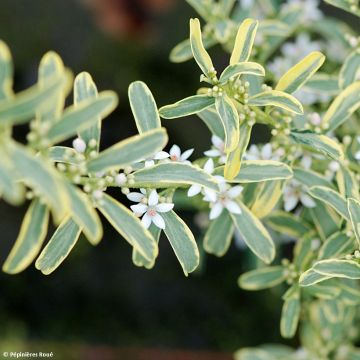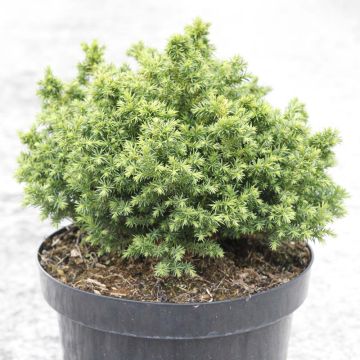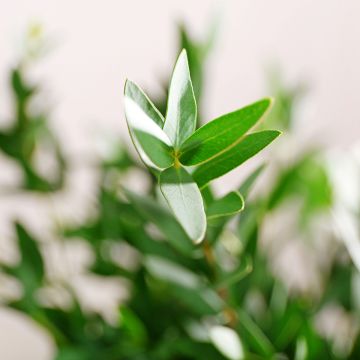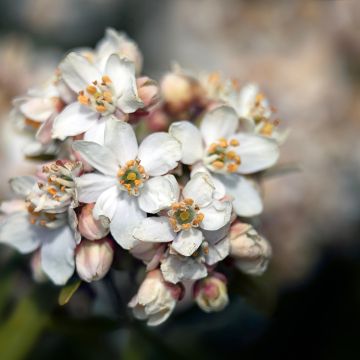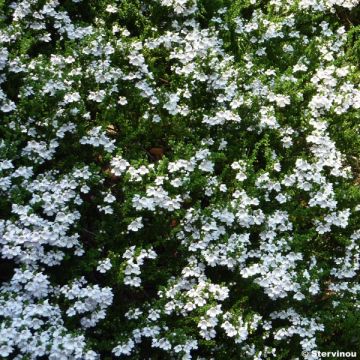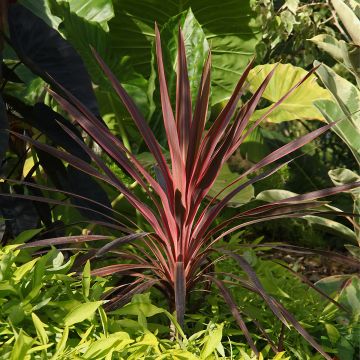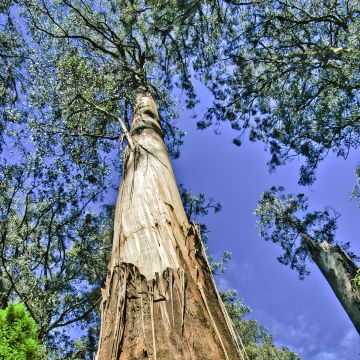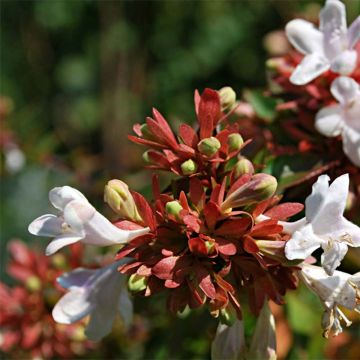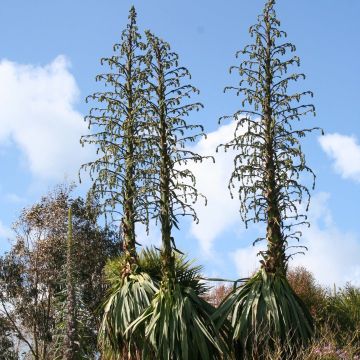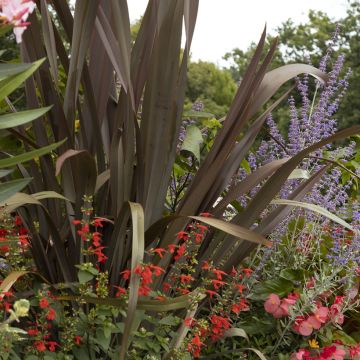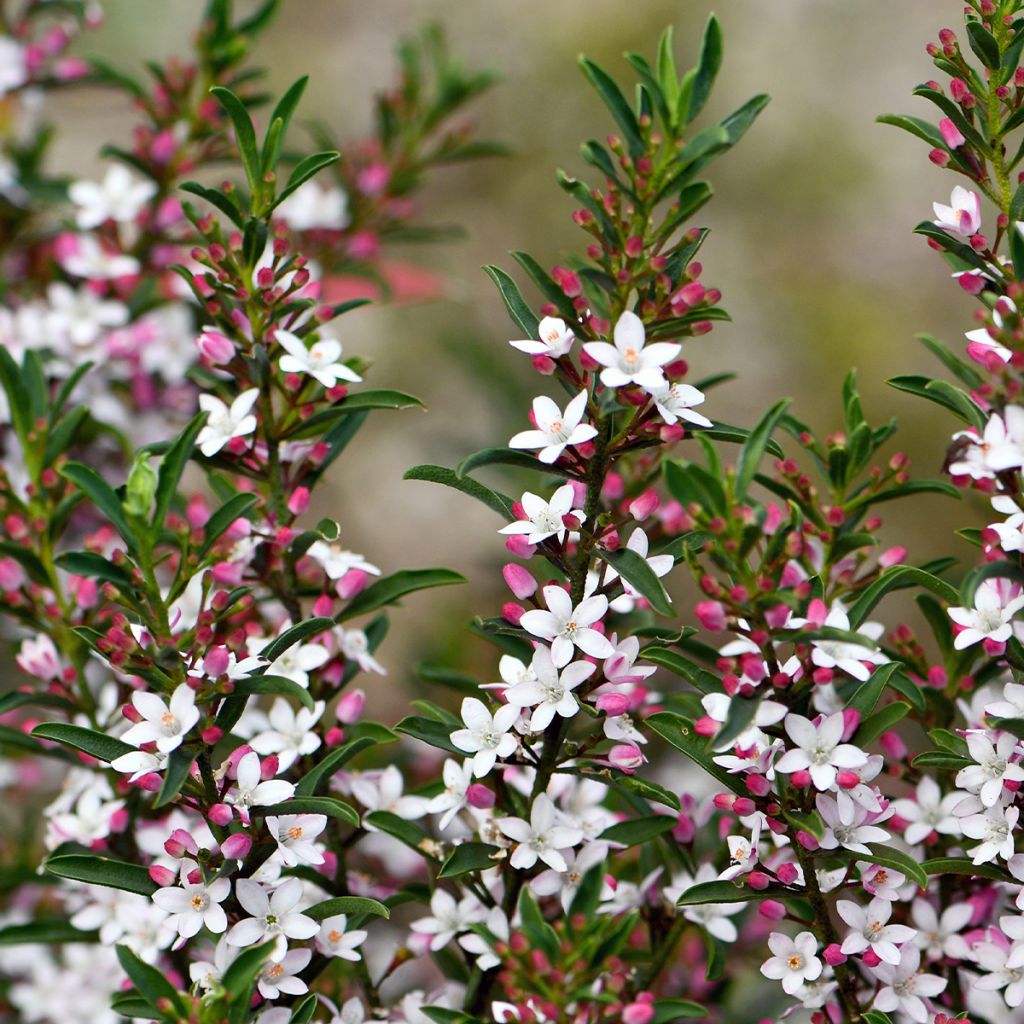

Eriostemon myoporoides
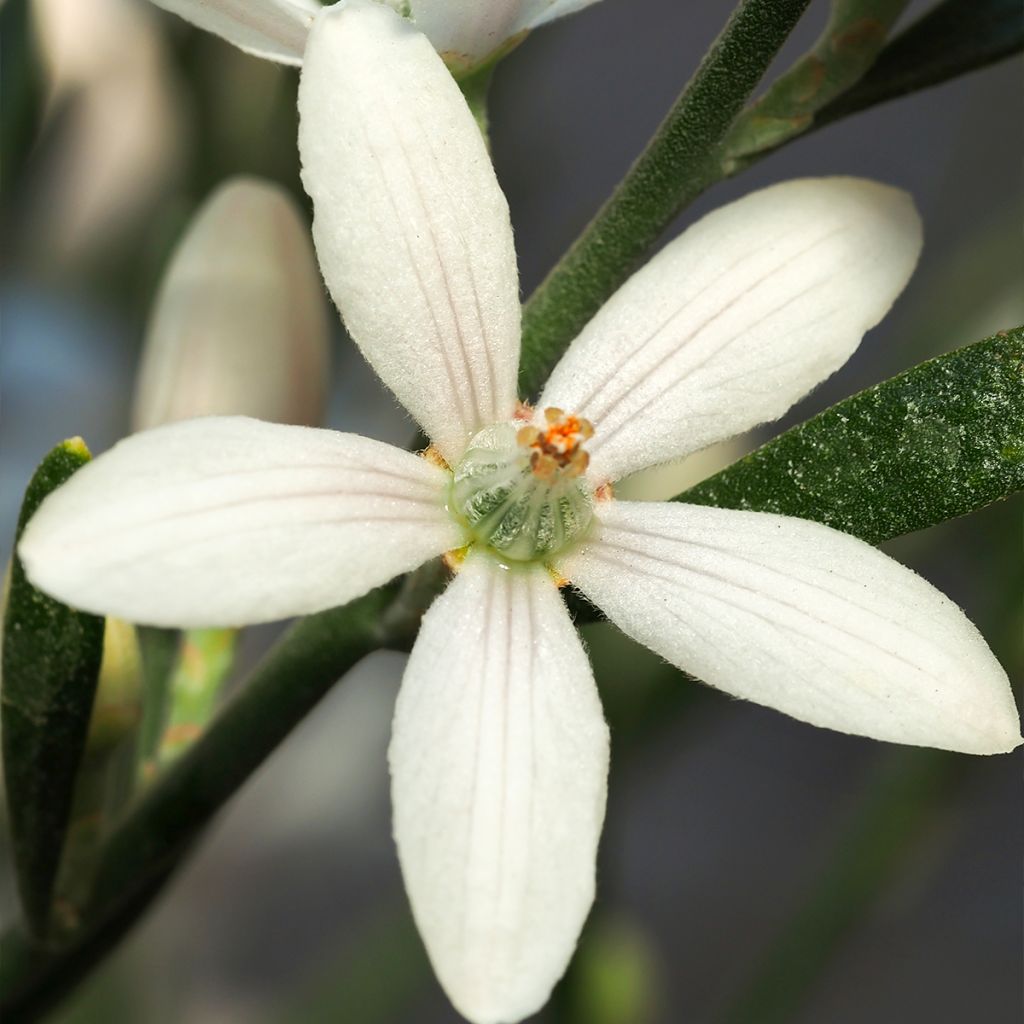

Eriostemon myoporoides
Eriostemon myoporoides
Eriostemon myoporoides
Long-leaf Wax Flower
This item cannot be shipped to the selected country
Delivery charge from €5.90
More information
Schedule delivery date,
and select date in basket
This plant carries a 24 months recovery warranty
More information
We guarantee the quality of our plants for a full growing cycle, and will replace at our expense any plant that fails to recover under normal climatic and planting conditions.
From €5.90 for pickup delivery and €6.90 for home delivery
Express home delivery from €8.90.
Does this plant fit my garden?
Set up your Plantfit profile →
Description
Eriostemon myoporoides, also called Philotheca myoporides, is a highly floriferous and aromatic bush related to Boronia and citrus trees, which will delight enthusiasts of Australian plants. It forms a generally rounded mass, covered with glossy, dark green foliage, on which stand out pink flower buds opening into small, white, star-shaped flowers, with a waxy texture and a sweet and sugary fragrance. It blooms from the end of winter for a long period. Comfortable in acidic to neutral soils, it can withstand short frosts of around -10°C (14 °F) in well-drained soil. If you have a garden located near the sea this Eriostema may thrive in the ground in an ericaceous bed. As it performs well in pots, gardeners can admire it on the terrace throughout the summer, and bring it indoors in winter, sheltered in a greenhouse or a slightly heated conservatory.
Eriostemon myoporoides, now classified in the genus Philoteca, is the most widespread in cultivation: this bush with a winter flowering, or at least early flowering, appeared in Europe in the 1820s.
Although the species Philotheca myoporoides is represented by 9 subspecies, the one that is propagated in horticulture forms a rounded and dense bush capable of reaching 2 metres (6 feet 7 inches) in all directions, often wider than tall. Branching from the base, it has warty stems that bear, oblong, evergreen leaves, pointed at their tips and 10cm (3.9 in) long. Their thick leaves are a fairly deep, vivid green and rich in essential oils. When crushed, they release an aroma reminiscent of orange blossom. In mild climates, the flowers appear from October, gathered in clusters of 3 to 5 pink buds, in the axils of the leaves and last until February or May depending on the climate. The buds open into a star-shaped corolla composed of 5 white, waxy petals, sometimes tinged with pink, surrounding fused orange stamens in a tube. These flowers measure 2cm (0.8 in) wide, but they are so numerous in winter and spring that they almost make the foliage disappear.
This Eriostemon cannot withstand frosts below -10°C (14 °F), tolerates excessive limestone and dry soil, and prefers partial shade. Its specific requirements must be followed to succeed in its cultivation and enjoy its magnificent flowering. In the garden it can be paired with Boronia heterophylla, Galvezia speciosa, Gomphostigma virgatum, broom shrubs, or white, pink, or red heathland plants. On the terrace or balcony, it can be surrounded by Cape leadwort, with its long blue flowering, a Tibouchina, or a Leptospermum Wiri Kerry.
Report an error about the product description
Eriostemon myoporoides in pictures
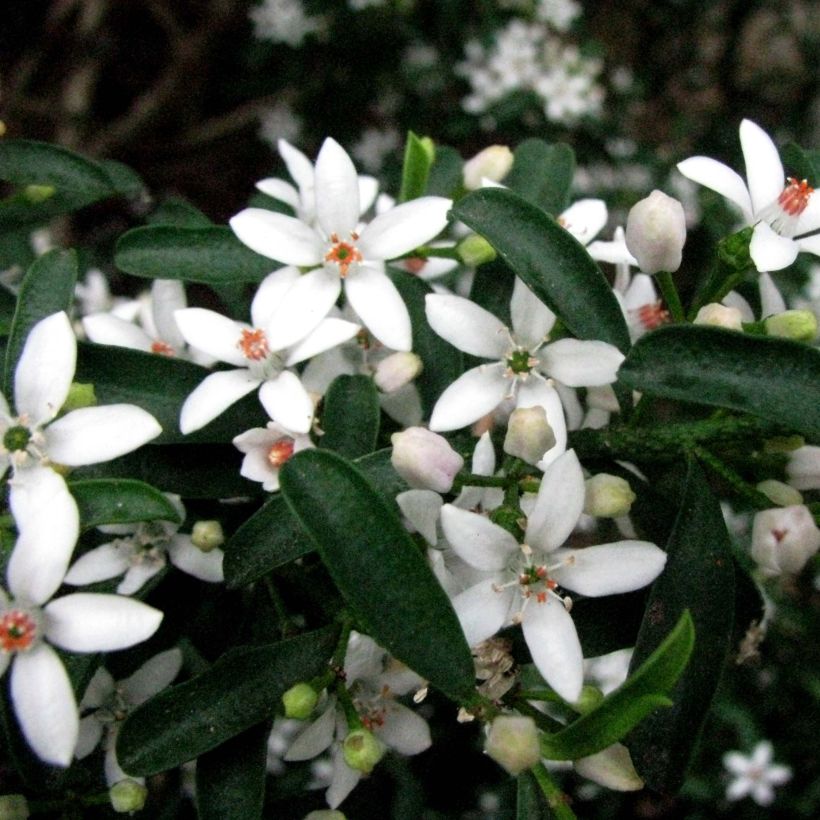

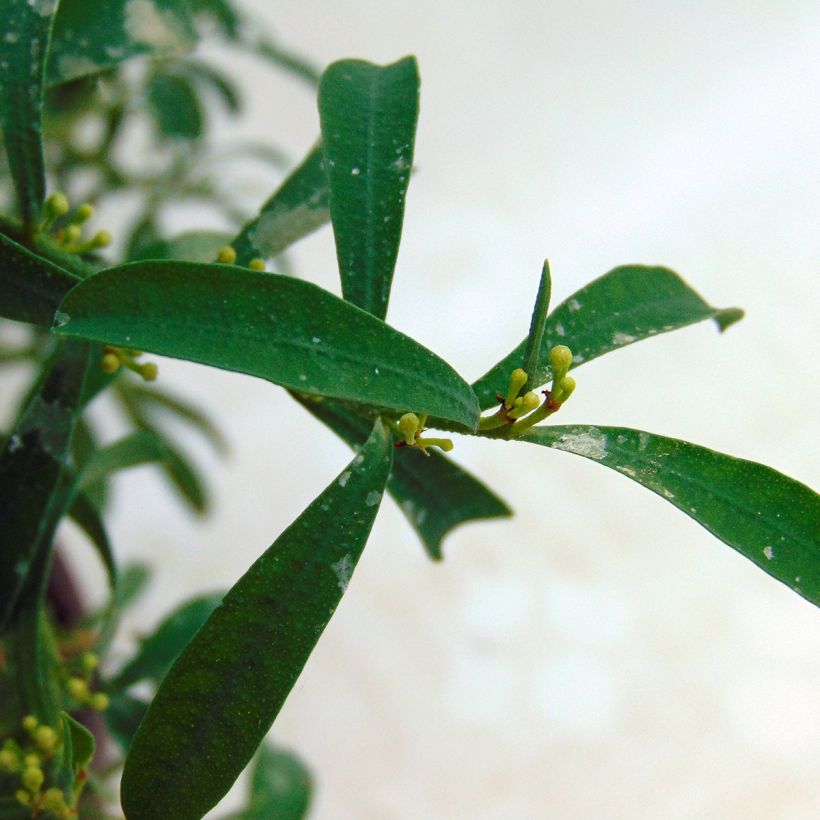

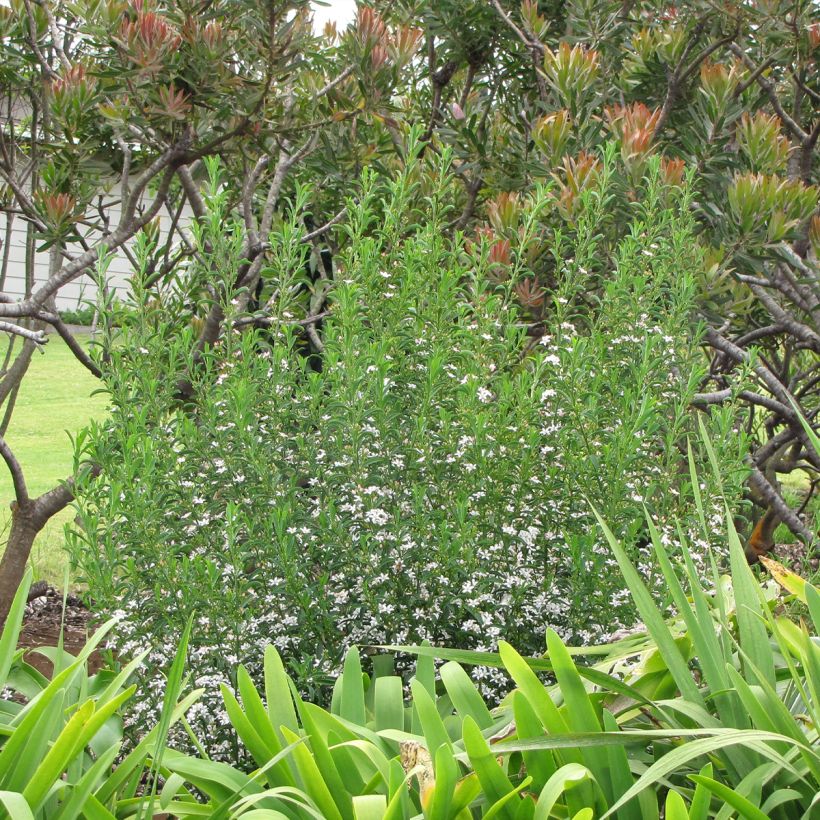

Plant habit
Flowering
Foliage
Botanical data
Eriostemon
myoporoides
Rutaceae
Long-leaf Wax Flower
Australia
Other Eriostemon - Philotheca
Planting and care
Culture:
Philotheca myoporoides is hardy down to -10°C (14 °F), in very well-drained soil. It tolerates drought once established, as well as sea spray. Plant it in spring in the ground or in pots. Choose a sunny or semi-shaded exposure, which it will particularly appreciate in hot climates. The soil should be light, very well-draining, low to non-limestone, neutral to acidic: a mix of ericaceous soil, sand and compost is ideal. Water the Eriostemon with non-limestone or low-limestone water in summer for the first two years in the ground.
If grown in a pot, it can be taken outside as soon as severe frost is over. Choose a large container, as the planting substrate should always retain some moisture. Store your Boronia frost-free from autumn, in a cold greenhouse, or on an unheated veranda as it still needs some cold to induce its flower buds.
Pruning is not necessary, except to remove dead branches or rebalance the habit. But to make it denser, you can slightly shorten the end of the branches just after flowering. Pruning later will compromise the following year's flowering.
Multiplication: propagation by cuttings of semi-woody stems after flowering, placed in a special seed compost kept moist and covered.
Planting period
Intended location
Care
-
, onOrder confirmed
Reply from on Promesse de fleurs
Evergreen shrubs
Haven't found what you were looking for?
Hardiness is the lowest winter temperature a plant can endure without suffering serious damage or even dying. However, hardiness is affected by location (a sheltered area, such as a patio), protection (winter cover) and soil type (hardiness is improved by well-drained soil).

Photo Sharing Terms & Conditions
In order to encourage gardeners to interact and share their experiences, Promesse de fleurs offers various media enabling content to be uploaded onto its Site - in particular via the ‘Photo sharing’ module.
The User agrees to refrain from:
- Posting any content that is illegal, prejudicial, insulting, racist, inciteful to hatred, revisionist, contrary to public decency, that infringes on privacy or on the privacy rights of third parties, in particular the publicity rights of persons and goods, intellectual property rights, or the right to privacy.
- Submitting content on behalf of a third party;
- Impersonate the identity of a third party and/or publish any personal information about a third party;
In general, the User undertakes to refrain from any unethical behaviour.
All Content (in particular text, comments, files, images, photos, videos, creative works, etc.), which may be subject to property or intellectual property rights, image or other private rights, shall remain the property of the User, subject to the limited rights granted by the terms of the licence granted by Promesse de fleurs as stated below. Users are at liberty to publish or not to publish such Content on the Site, notably via the ‘Photo Sharing’ facility, and accept that this Content shall be made public and freely accessible, notably on the Internet.
Users further acknowledge, undertake to have ,and guarantee that they hold all necessary rights and permissions to publish such material on the Site, in particular with regard to the legislation in force pertaining to any privacy, property, intellectual property, image, or contractual rights, or rights of any other nature. By publishing such Content on the Site, Users acknowledge accepting full liability as publishers of the Content within the meaning of the law, and grant Promesse de fleurs, free of charge, an inclusive, worldwide licence for the said Content for the entire duration of its publication, including all reproduction, representation, up/downloading, displaying, performing, transmission, and storage rights.
Users also grant permission for their name to be linked to the Content and accept that this link may not always be made available.
By engaging in posting material, Users consent to their Content becoming automatically accessible on the Internet, in particular on other sites and/or blogs and/or web pages of the Promesse de fleurs site, including in particular social pages and the Promesse de fleurs catalogue.
Users may secure the removal of entrusted content free of charge by issuing a simple request via our contact form.
The flowering period indicated on our website applies to countries and regions located in USDA zone 8 (France, the United Kingdom, Ireland, the Netherlands, etc.)
It will vary according to where you live:
- In zones 9 to 10 (Italy, Spain, Greece, etc.), flowering will occur about 2 to 4 weeks earlier.
- In zones 6 to 7 (Germany, Poland, Slovenia, and lower mountainous regions), flowering will be delayed by 2 to 3 weeks.
- In zone 5 (Central Europe, Scandinavia), blooming will be delayed by 3 to 5 weeks.
In temperate climates, pruning of spring-flowering shrubs (forsythia, spireas, etc.) should be done just after flowering.
Pruning of summer-flowering shrubs (Indian Lilac, Perovskia, etc.) can be done in winter or spring.
In cold regions as well as with frost-sensitive plants, avoid pruning too early when severe frosts may still occur.
The planting period indicated on our website applies to countries and regions located in USDA zone 8 (France, United Kingdom, Ireland, Netherlands).
It will vary according to where you live:
- In Mediterranean zones (Marseille, Madrid, Milan, etc.), autumn and winter are the best planting periods.
- In continental zones (Strasbourg, Munich, Vienna, etc.), delay planting by 2 to 3 weeks in spring and bring it forward by 2 to 4 weeks in autumn.
- In mountainous regions (the Alps, Pyrenees, Carpathians, etc.), it is best to plant in late spring (May-June) or late summer (August-September).
The harvesting period indicated on our website applies to countries and regions in USDA zone 8 (France, England, Ireland, the Netherlands).
In colder areas (Scandinavia, Poland, Austria...) fruit and vegetable harvests are likely to be delayed by 3-4 weeks.
In warmer areas (Italy, Spain, Greece, etc.), harvesting will probably take place earlier, depending on weather conditions.
The sowing periods indicated on our website apply to countries and regions within USDA Zone 8 (France, UK, Ireland, Netherlands).
In colder areas (Scandinavia, Poland, Austria...), delay any outdoor sowing by 3-4 weeks, or sow under glass.
In warmer climes (Italy, Spain, Greece, etc.), bring outdoor sowing forward by a few weeks.

































